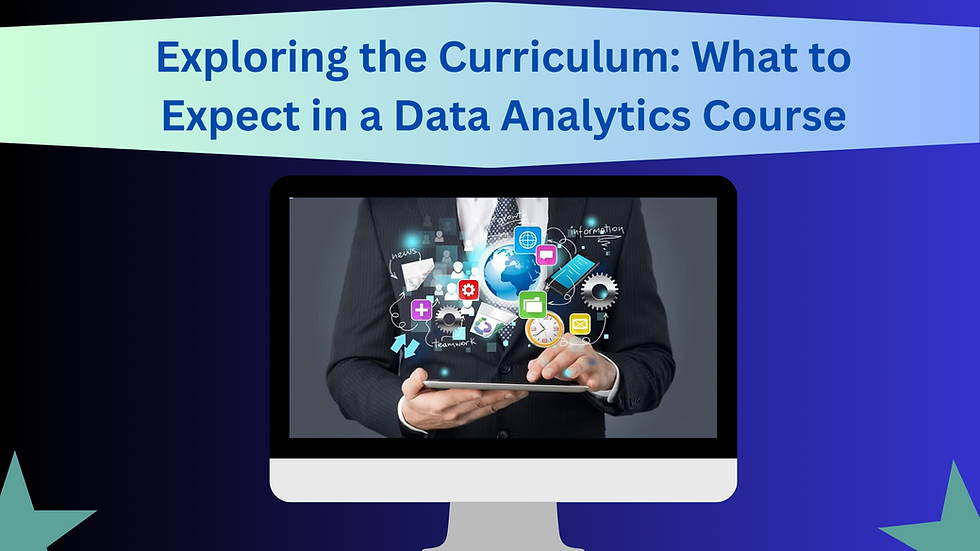Exploring the Curriculum: What to Expect in a Data Analytics Course
- Vaishali pal

- Apr 16, 2024
- 3 min read

The need for qualified data analytics specialists is growing in today's data-driven environment. With businesses relying heavily on data to make informed decisions, individuals equipped with the necessary skills to analyze and interpret data are highly sought after. As a result, data analytics courses have become increasingly popular among students and professionals alike, offering comprehensive training in various aspects of data analysis. If you're considering delving into the realm of data analytics or looking to enhance your existing skills, understanding what to expect in a data analytics course is crucial.
Introduction to Data Analytics Courses
Data analytics courses are designed to equip individuals with the knowledge and skills needed to effectively analyze and interpret data to derive meaningful insights. These courses typically cover a wide range of topics, including statistical analysis, data visualization, machine learning, and programming languages such as Python and R. Whether you're a beginner or have some prior experience in data analytics, there are courses tailored to suit your level of expertise.
Foundational Concepts
One of the first things you can expect to encounter in a data analytics course is an introduction to foundational concepts. This may include understanding basic statistics, probability theory, and data manipulation techniques. Building a strong foundation in these areas is essential for performing meaningful analysis and drawing accurate conclusions from data sets.
Statistical Analysis
Statistical analysis is at the core of data analytics, and most courses will delve deep into this subject. Students will learn various statistical techniques for analyzing data, such as hypothesis testing, regression analysis, and analysis of variance (ANOVA). Understanding these techniques is vital for uncovering patterns, trends, and relationships within data sets.
Data Visualization
In addition to statistical analysis, data visualization plays a crucial role in data analytics courses. Visualizing data through charts, graphs, and dashboards allows analysts to communicate their findings effectively. Students will learn how to use visualization tools and techniques to create compelling visual representations of data that can aid in decision-making processes.
Programming Languages
Proficiency in programming languages is a fundamental requirement for data analytics professionals. Python and R are among the most commonly used languages in the field, and many data analytics courses will cover these languages extensively. Students will learn how to write code to manipulate data, perform statistical analysis, and create visualizations.
Machine Learning
Machine learning is an increasingly important aspect of data analytics, allowing analysts to develop predictive models and uncover hidden insights within data. Many data analytics courses will include modules on machine learning algorithms, such as linear regression, logistic regression, decision trees, and clustering techniques. Students will learn how to apply these algorithms to real-world data sets and evaluate their performance.
Data Mining
Data mining involves the process of discovering patterns and relationships within large data sets. In a data analytics course, students will learn various data mining techniques, such as association rule mining, clustering, and classification. These techniques are used to extract valuable information from data and make data-driven decisions.
Real-World Applications
One of the most exciting aspects of data analytics courses is the opportunity to work on real-world projects. Many courses incorporate hands-on projects where students can apply their knowledge and skills to solve practical problems. These projects may involve analyzing real data sets provided by industry partners or tackling specific challenges faced by organizations.
Ethical Considerations
As data analytics continues to evolve, ethical considerations surrounding data usage and privacy have come to the forefront. Data analytics courses often include discussions on ethical issues related to data collection, storage, and analysis. Students will explore topics such as data privacy laws, bias in data analysis, and the ethical responsibilities of data analysts.
Conclusion
In conclusion, Data Analytics courses in Delhi, Noida & all other cities in India, offer a comprehensive exploration of the tools, techniques, and concepts essential for analyzing and interpreting data effectively. Whether you're a novice or an experienced professional, there are courses available to suit your needs and level of expertise. By understanding what to expect in a data analytics course, you can embark on a journey to acquire the skills needed to thrive in today's data-driven world. So, dive in, explore the curriculum, and unlock the endless possibilities of data analytics.


